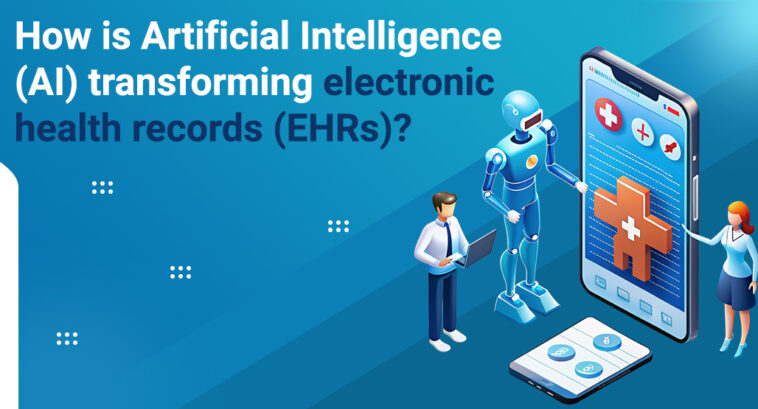Healthcare is more than simply doctors and patients; data-driven decisions can make the difference between life and death. Electronic Health Records (EHRs) have already modernized the way medical information is kept and accessible, but they are about to undergo a significant transition with the introduction of Artificial Intelligence (AI).
There are few solutions for bridging the gap between systems and procedures and improving the mismatch. Designing EHR systems that are easy to integrate and simplify can help in this regard because they fit into workflows more seamlessly. The creation of such systems is time-consuming and challenging. In such cases, open-source EHRs offer some relief because the software is available for free. Though the software is free, providing customized EHR systems will require a significant amount of programming and infrastructure. These open-source systems are poorly maintained because they are primarily meant for tiny medical offices.
Healthcare involves more than just doctors and patients; data-driven decisions can be the difference between life and death. Electronic Health Records (EHRs) have already changed the way medical information is stored and accessed, but they are set to undergo a huge transformation with the advent of Artificial Intelligence (AI).
There are a few ways to close the gap between systems and procedures and correct the mismatch. Designing EHR systems that are simple and easy to integrate can help in this area because they fit more naturally into workflows. Creating such systems is time-consuming and difficult. In such circumstances, open-source EHRs provide some relief because the software is free.
Why use AI in EHR?
AI-powered EHR systems integrate effortlessly and provide solutions with a wide range of features. Machine learning and Natural Language Processing (NLP) can assist in capturing patients’ medical experiences, organizing enormous EHR data banks to locate key records, assessing patient satisfaction, and so on. Machine learning models combined with NLP can assist healthcare providers in transcribing speech from a voice recognition system to text.
The algorithms can be trained properly on vast amounts of patient data on the patient’s treatment, equipment used for treatment, respective doctor, and so on, and then carefully segregated based on the specific patient, sickness, therapy for illness, etc. EHR systems are widely classified and briefly discussed below.
The Role of artificial intelligence (AI) in electronic health records
The use of Artificial Intelligence (AI) in Electronic Health Records (EHR) is fast changing the healthcare environment, opening up new potential to improve patient care, improve decision-making, and optimize healthcare operations. AI is being integrated into EHR systems to harness the power of data and advanced algorithms, resulting in numerous major roles and benefits:
Data Management and Organization
EHRs create vast volumes of patient data, which AI can efficiently handle and organize. AI algorithms can categorize and structure data, allowing healthcare providers to better access and analyze crucial patient information.
Extraction of Data
By employing AI, healthcare professionals can extract patient data from a variety of sources such as fax, clinical data, provider notes, and so on, as well as recognize key terms that provide actionable insights.
Predictive analytics
Predictive models based on big data will help clinicians detect potentially fatal diseases. AI can also improve medical picture interpretation algorithms, which might be linked to EHRs to give decision assistance and treatment plans.
Clinical Documentation
Healthcare firms use AI to create NLP-powered solutions that can interact with EHRs to capture data from clinical notes, allowing doctors to focus more on their patients and treatments.
Decision Support
Treatment approaches and tactics are typically decided on a generic basis. However, with AI integrated into the systems, more machine-learning solutions that enable personalized treatment and learning from new and real-time data are emerging.
EHRs save lives during emergencies by providing the patient’s complete medical history because they are maintained electronically and allow healthcare providers to access patient data from any location. They promote communication not only among physicians but also between physicians and patients. Enhanced communication always results in better care. Despite typical issues such as physician burnout, associated expenses, and a lack of interoperability between separate systems, EHRs have the potential to add significant value to the healthcare system.
This post was created with our nice and easy submission form. Create your post!





